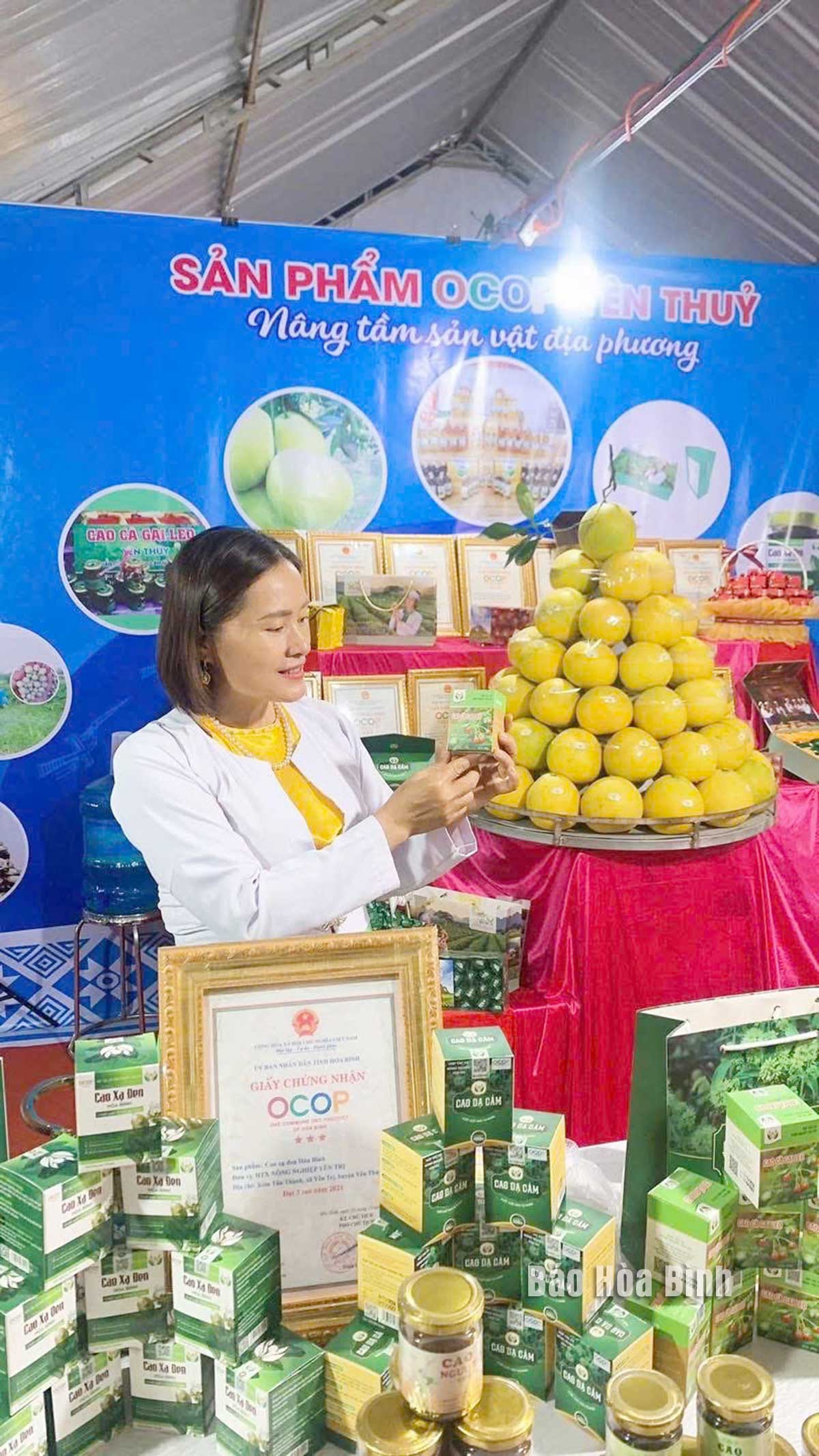
Maximizing local potential and advantages, Yen Tri commune in Yen Thuy district is actively promoting the cultivation of medicinal herbs and turning medicinal herbs into One Commune - One Product (OCOP) products.

OCOP products by Yen Tri Agricultural
Cooperative are promoted at the 2nd Da River Fish and Shrimp Festival held in
November 2024.
Chairman of the Yen Tri Commune People's
Committee Bui Phi Diep said that the economic value of medicinal plants is
tenfold higher than traditional crops like potatoes and cassava. So, local
farmers have prioritised the cultivation and expansion of medicinal herbs in
recent years.
Currently, approximately 15 ha of previously
unproductive land have been converted for medicinal herb cultivation, involving
over 140 households. This includes 6 ha of black licorice, 1 ha of "da cam” (Herba
Hedyotis capitellata), and 8 ha of other herbs. The annual yields reach over
450 tonnes, equivalent to 121 tonnes of finished products.
In addition to favourable climate and soil
conditions, Yen Tri has a strong network of traditional herbalists, numbering
around 50, including a nationally recognised herbalist. These practitioners
preserve and promote many traditional remedies, particularly for liver, joint,
kidney, and digestive ailments. The long-standing experience of Yen Tri
residents in cultivating and caring for medicinal plants creates favourable
conditions for sustainable development of both raw material zones and OCOP
herbal products.
The commune currently boasts two 3-star OCOP
herbal products - black licorice and "da cam” extract, produced by the Yen Tri
Agricultural Cooperative. Utilising modern extraction technology to preserve
medicinal properties, these OCOP products have earned the trust and high regard
of consumers both locally and beyond.
Despite these achievements, the sustainable development
of medicinal plants and OCOP products in Yen Tri faces challenges, including
unstable product markets and a lack of robust supply chains. Additionally,
post-harvest processing technology remains limited and unsynchronised.
Recently, the Hoa Binh provincial People’s
Committee has approved a project on piloting the development of OCOP herbal
products linked to local raw material zones in Yen Tri commune, creating
opportunities for sustainable growth for the locality.
The project outlines solutions to address
existing issues, including enhancing infrastructure, irrigation systems,
workforce training, modern technology transfer, and promoting trade and product
marketing. Strengthening partnerships with businesses to ensure stable product
outputs is also a priority.
The project also pointed out the need to explore
new product lines from medicinal plants, such as instant powders, tea bags,
herbal cakes, and herbal beverages.
The project is expected to support the expansion
of 36 ha of raw material zones with crops like black licorice, "da cam”,
"che vang" (Jasminum subtriplinerve), Jiaogulan, and 25 ha of buffer
zones for growing "ca gai leo” (Solanum trilobatum) in the neighbouring
communes of Da Phuc and Lac Luong.
This project will open promising prospects for
developing OCOP herbal products in Yen Tri, ensuring sustainable growth and
contributing to improving the living standards of the local people while
promoting its socio-economic development.
In Lac Thuy district, communes have been succeeded in promoting their One Commune-One Product (OCOP) products while others are still struggling to position their typical farming products in market. Some communes in the district still fail to have their products met OCOP programme’s requirements, while others have seen their certifications expired.
The inspectorate agency of Hoa Binh province has issued Official Dispatch No. 1090/TTr-PCTN to provincial departments, agencies, localities, business associations, enterprises, and investors regarding measures to improve informal component indexes of the Provincial Competitiveness Index (PCI).
Hoa Binh is taking concrete steps to improve its investment environment, with a strong focus on supporting businesses, settling obstacles for strategic investors, and creating opportunities for robust development in the coming years.
Under the blazing early summer sun, the construction site of Nhuan Trach Industrial Park (IP) in Luong Son district is abuzz with activities from dawn to dusk, a testament to the determination of the investor to meet their construction targets on schedule.



